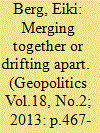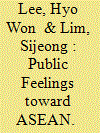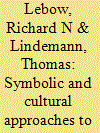|
|
|
Sort Order |
|
|
|
Items / Page
|
|
|
|
|
|
|
| Srl | Item |
| 1 |
ID:
133542


|
|
|
|
|
| Publication |
2014.
|
| Summary/Abstract |
A number of observers have expressed serious concerns that Al-Qaeda in the Islamic Maghreb (AQMI), as it expands in the Sahel, may become strong enough to be a threat to Europe and carry on the global mission of Al-Qaeda as conceived by bin Laden. This fear seems unwarranted. Using institutional analysis to study the AQMI behavioral fluctuations over the last decade, this article argues that AQMI's need to find a compromise between external and internal legitimacy has constrained its behavior. The affiliation of the Algerian terrorists with Al-Qaeda was in many ways a marriage of convenience that created a number of internal contradictions. At the cognitive level, implicit Algerian nationalism to rid the country of its corrupt regime remains at odds with pan-Islamic views shared by Al-Qaeda's leadership. At the normative level, indiscriminate suicide bombing supported by Al-Qaeda is abhorrent to many Algerian terrorists, who construe their mandate in the spirit of the Algerian war of independence where it is their duty to protect civilians. These and other contradictions prevent AQMI from developing a coherent political agenda and thus it is less likely to engage in a long-term conflict against European societies.
|
|
|
|
|
|
|
|
|
|
|
|
|
|
|
|
| 2 |
ID:
122983


|
|
|
|
|
| Publication |
2013.
|
| Summary/Abstract |
One way to approach conflict management is to use a four-dimensional political legitimacy criterion, which could set the agenda for enhancing peace prospects in Cyprus, Moldova and Bosnia and Herzegovina (BiH). Here the argument is that through measuring the internal legitimacy of conflicting parties and then comparing and contrasting the given empirical values on the scales of cohesion/security and democracy/performance, we may be able to distinguish conflicting pairs either "merging together" or "drifting apart", depending on how the secessionist entities position themselves vis-à-vis their parent states. Empirical facts on the ground tell us that Cyprus may have the biggest chances of reunification, whereas Moldova's perspective looks meagre. The BiH, which has preserved its territorial integrity, faces real secessionist challenges, given the illegitimacy of the state and a manifest dissatisfaction with systemic deficiencies.
|
|
|
|
|
|
|
|
|
|
|
|
|
|
|
|
| 3 |
ID:
174812


|
|
|
|
|
| Summary/Abstract |
What determines how ASEAN is perceived by the citizens of its member states? Most studies on ASEAN take a state-centric and elite-oriented viewpoint. We improve on this by bringing the people of ASEAN into the center of the analysis. Considering lessons from the European Union’s internal legitimacy crisis, we develop hypotheses on how skill-based economic interests, sociocultural beliefs, and assessments of national context shape people’s attitude to ASEAN. Our hypotheses are tested using the latest data from the Asian Barometer Survey, covering eight of the 10 ASEAN countries. We find that citizen confidence in domestic governance and a positive assessment of major extra-regional powers are associated with a closer identification with ASEAN. Our analysis also identifies age and gender cleavages. ASEAN affinity is higher among older rather than younger and male rather than female respondents. Our findings have important policy implications for the proponents of ASEAN.
|
|
|
|
|
|
|
|
|
|
|
|
|
|
|
|
| 4 |
ID:
132919


|
|
|
|
|
| Publication |
2014.
|
| Summary/Abstract |
This forum offers a symbolic and cultural approach for understanding the outbreak of World War I that stresses the interactional and symbolic-cultural aspects of German decision makers' brinkmanship during the July crisis of 1914. Contrary to excessive structuralist accounts, the contributions focus on what actors 'do' and 'feel' during a crisis. In the German-Austrian case, symbolic interactions during the July crisis were strongly marked by challenges to the 'face' of decision makers. The second theme of the Forum is to question the purely 'material' nature of those structures traditionally referred to as permissive for World War I. Structures, in fact, are symbolic, too. Like theories on status discrepancy, the Forum stresses the impact of 'responsibility gaps'. However, the contributors also point to the emotional aspects and internal legitimacy problems caused precisely by those status lags.
|
|
|
|
|
|
|
|
|
|
|
|
|
|
|
|
|
|
|
|
|